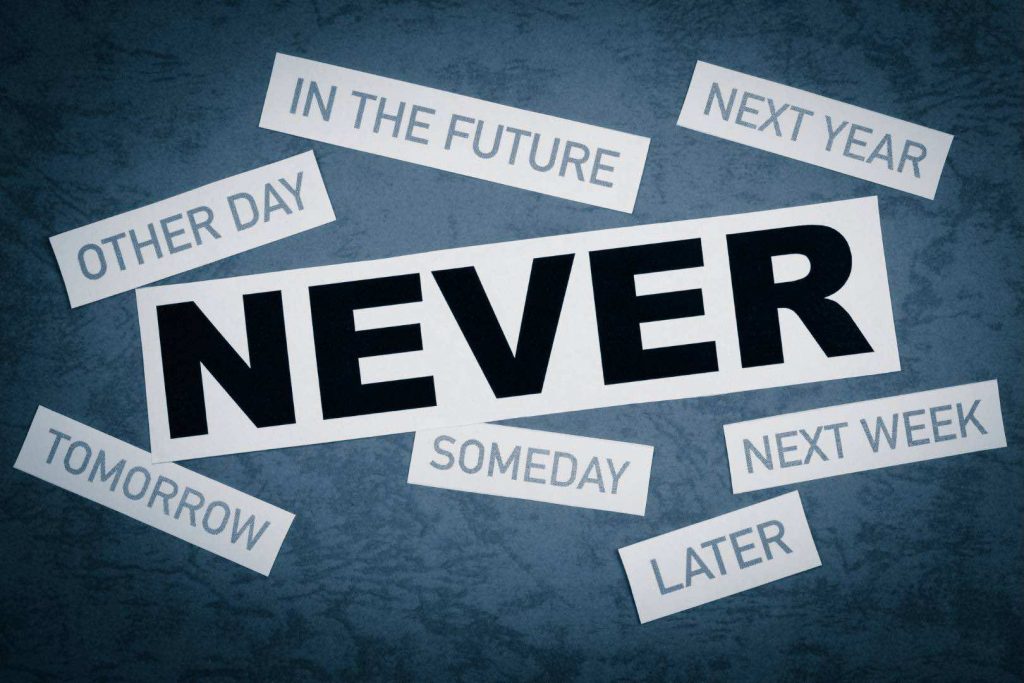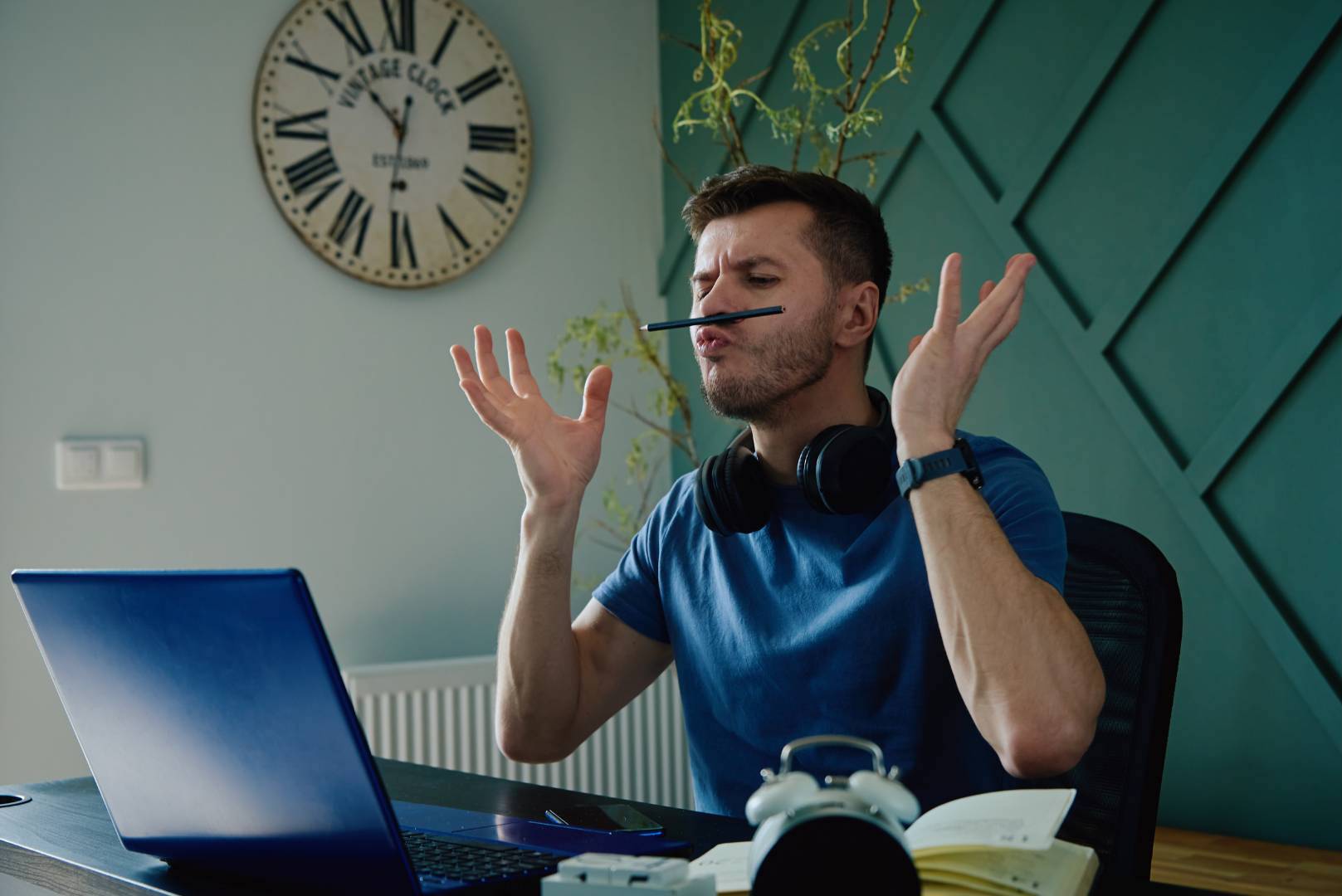There can be many reasons a person procrastinates and it’s something common. It seems obvious why we would procrastinate unpleasant tasks that we don’t want to do. But procrastinating the things you actually want to do can seem paradoxical.
So, whats happening? in this article I’m going to explain the main reasons why most people procrastinate, and what you can to stop procrastinating.
Why Do You Procrastinate Things You Want to Do?

There are 4 main reasons people procrastinate:
- Fear of failure
- Fear of judgement
- Perfectionism
- Avoidance of bad feelings
Let’s look at each in some detail.
Fear of a failure is big one.
It doesn’t really matter what it is, starting a new business, getting fit, losing weight, creating a piece of music or artwork, writing a book, or learning a new language, people often get anxiety about failing and it can be paralysing.
You may be concerned that others will condemn or mock you for failing, perhaps you fear their judgement. Or you might ridicule yourself with that self-critical little voice in your head whispering ‘see I told you so, I knew you’d fail’.
Failure can feel humiliating, but only if you allow it to.
If you’re a perfectionist like me, you probably know all too well how it can inhibit you from doing the things you want to do. That’s because we set unrealistic and unattainable standards. And when we don’t reach them, we beat ourselves up.
It’s counterproductive. We get stuck in all-or-nothing thinking. Perhaps you can relate to saying to yourself ‘if I can’t do it perfectly, there is no point in doing it at all’.
Fear also comes into play here. The fear is that you won’t be able to reach those unrealistic perfectionist standards. So, what do you do? You procrastinate.
But there is no such thing as perfect! Remember that. I wrote an article specifically about the struggles of a perfectionist and explain the endless cycle you can get stuck in. Feel free to check it out.
Finally, when we know a task may cause us bad feelings like fear, frustration, irritability, boredom, stress, anxiety, worry, and so on, we procrastinate. And it makes sense, no?
In a way our mind is subconsciously protecting us from the feelings that can cause us suffering. It prefers comfort over discomfort.
Even if it’s something you enjoy, if you have a fear of failure, being judged, or not being able to reach your unrealistic standards, then inevitably whatever it is will cause you distress. So, you procrastinate, not really knowing why.
“Procrastination is like a credit card: it’s a lot of fun until you get the bill.”
— Christopher Parker
Those Are the reasons You Procrastinate What You Want to Do
When I understood the above for the first time, it was a revelation. Prior to that, I kept asking myself, ‘I love making music, but why am I procrastinating it?’.
The answer? I feared failure. I was worried I wouldn’t create something up to my perfectionist standards. This played out when I was making music. I would start to get stressed and annoyed with myself.
I would re-record the same part over and over again, because it wasn’t ‘perfect’. So, I was causing myself bad feelings, and thus the long period of procrastination began.
So, how did I get out this vicious cycle, and how can you do the same? Well, read on and I’ll explain how you can stop procrastination from taking over your life.
Develop Self-Awareness
Self-awareness is everything, because once you’re aware of why and when you’re behaving a certain way, you can change it.
I’ve already listed the reasons above you are likely procrastinating, so that’s half the battle. Next, begin to recognise when you are procrastinating. Simply say to yourself, ‘I’m procrastinating’, and then ask yourself why. Is it one of the reasons above?
Then you can take positive action. A great way to develop and cultivate self-awareness is to practice mindfulness meditation and incorporate paying attention to the present moment as a daily habit. This will help to become aware of your thoughts, how they are impacting you, and prevent them from inhibiting your life.
You can learn all about the practice in my article ‘What is Mindfulness?’.
“Our life is shaped by our mind, for we become what we think.”
— Buddha
Ask ‘What if I Can?’ For a Sense of Purpose
Instead of asking yourself ‘what if I fail?’, ask yourself ‘what if I can do this?’. What if I can lose weight? What if I can finish writing that book? What if I can create that piece of artwork? What if I can launch a successful business?
And how would you feel? Would there be feelings of accomplishment, self-worth, confidence? Apart from these positive feelings, will you gain something new? Perhaps money, a new sense of purpose, a better life for yourself, a healthier body.
Doing this exercise will remind yourself of the purpose of the task at hand, and the benefits it will bring.
Break Tasks Down, Set Time Limits, & Reward Yourself
Mostly, I enjoy writing articles but they take a lot of research, time, work, and focus for long periods of time. So, knowing I have to write an 2,000-word article can be feel daunting at times. What do I do to help then?
I break down writing the article into manageable chunks. I say ok, ‘let’s just write 500 words today’. And then I set myself a timer of 20 minutes. This is a much easier goal to aim for, plus working for just 20 minutes is very doable.
After the 20 minutes is up, I have a break for 5 minutes and then reward myself. This could be making a cup of tea, watching a funny video, or playing guitar for a while.
This is important because some tasks that we do will not give us any instant gratification or reward. Think of starting a business or losing weight. It’s not going to happen quickly. So, we lose our motivation.
By rewarding yourself for the little steps you take -which are essential to achieve anything in life- you get that gratification, and your brain will release those happy chemicals that make you feel good.
Apply these big three to the next time you’re doing something.
- Break tasks down
- Set time limits
- Reward yourself
See for yourself just what a huge difference these simple tips can do for your productivity.
Be Patient and Compassionate with Yourself
Nothing worth doing comes easy. Take your time with it. It may take longer than you hoped, but that’s ok. Do you know what’s important? That you are trying your best.
Some people never even bother to try and that’s usually the reason they mock or berate you. They’re insecure and frustrated at themselves for not making any effort, but they’re projecting those feelings onto you.
So, seriously screw what others think of you, it doesn’t matter! You don’t owe them any explanation or justification. Remove unwanted negative energy and people from your life.
Just remember that you deserve loving kindness. To help with this, make a habit of saying to yourself ‘may I be free from suffering’, ‘may I be happy’, ‘may I be free from harm’.
“Talk to yourself like you would someone you love”.
— Brene Brown
Remove Distractions
This is an obvious one, but it really matters. If you’re at home surrounded by distractions, noise, other people, then of course you are going to be tempted to do other stuff.
How about going to a library, a café, or even just a quiet room in your home instead? Anywhere with less distractions. It’s much easier to go into work mode when you’re not in such a familiar environment.
You could even treat it is a reward. Enjoy a nice coffee with a cake whilst you work in a cosy café. It does make a big difference going somewhere else to work, because you know you’ve committed going elsewhere for that specific reason.
If that’s not an option. Do what you can. Turn off your phone, limit social media, and other online usage. Unplug the TV, and if you don’t need to use the internet, turn off the router. There are many ways to remove unnecessary distractions.
You Can Defeat Procrastination
Now you know why you procrastinate the things you want to do. Not only that, but I’ve given you some steps you can take to change this way of being. As I said earlier, once have awareness, you can take positive action.
Now the ball is in your court. Try the above suggestions for yourself and see if you find them helpful. What do you have to lose? Once you can get a grip on procrastination, your productivity will go through the roof.
What have you been putting off recently? And do you think it’s for any of the reasons I mentioned in this article? Let me know in the comments section.
Take care of yourselves,
Chris from Mindful Way to Be


